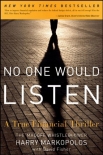No One Would Listen: A True Financial Thriller by Harry Markopolos (rainbow fish read aloud .txt) 📗

- Author: Harry Markopolos
Book online «No One Would Listen: A True Financial Thriller by Harry Markopolos (rainbow fish read aloud .txt) 📗». Author Harry Markopolos
It was Frank Casey who first brought Bernie Madoff to my attention. Frank Casey worked on the other side of the ledger; years ago he would have been known as a customer’s man, but now he was a marketing representative. Frank is a gregarious Irishman, a man who attacks life and has combined his gift of language with his effervescent personality to become a successful salesman. In addition to selling our financial products, he also would find needs in the market that we might fill. On Wall Street a salesman is an interpreter of numbers. While Frank isn’t a quant, being the middleman between the customers and the quants meant that he had to have enough understanding of the market to bring needs and products together.
Frank had been working in the industry doing a great variety of jobs for more than a quarter century when we met. He grew up with a love for the market, using money he earned running a jackhammer on a summer job while still in high school to buy his first stock, Botany 500, a men’s clothier. At that time he didn’t own a suit, but he had the stock. He doubled his money, and he was hooked. He remembers spending much of his junior and senior years in high school reading the stock market pages and books about investing—and writing poetry. He learned the realities of the market less than a year later; when the 1967 Israeli-Arab War started, he figured American Jews would become patriotic, so he invested in Hebrew National—and watched as the stock sat unmoved. But after that there was no doubt in his mind where he wanted to work. After four years in the military, finishing as an army captain, Airborne Ranger qualified, he started as a trader at Merrill Lynch in 1974 with an interesting strategy: “I figured everybody else who was starting as I was, cold-calling from the Yellow Pages, went from the front to the back. My buddy and I split the book in the middle, he worked middle to the back and I worked middle to the front. We called every business in the Boston Yellow Pages. That was our sophisticated strategy.” By 1987 Frank was hedging more than a billion dollars in mortgages for banks. Because during most of his career he has earned his paycheck from commissions rather than from a fixed salary, mostly by creating and executing sales of his own products, he has developed an intuitive feeling about the people working on Wall Street and the products they market. So while at the very beginning he couldn’t quite figure out what Bernie Madoff was doing, whatever it was, it just didn’t feel right to him.
Frank Casey and Rampart cofounder Dave Fraley had met while both of them were working at Merrill Lynch in the mid-1970s. Like many relationships on Wall Street, their paths had crossed several times through several companies since then. When Frank found out that Rampart was specializing in options, an area in which he had a lot of experience, he approached Fraley, the managing partner in charge of marketing our products, and began working on commission. He was a Wall Street prospector, finding companies that would benefit from Rampart’s products. In return, Dave Fraley directed me to execute trades through Frank, for which he earned a small commission. That’s how we met. To me, he was an aggressive marketer. As I later found out, to him I was just another geek portfolio manager. It was a typical Wall Street retail versus institutional relationship. We needed each other, so we got along. That began changing in February 1998 when Fraley hired him to market products and develop new business.
It was impossible not to know Frank was there. His office was right next to the trading room and he was salesman-loud. At first we simply shut his door; but his voice boomed right through that closed door, so eventually management had to erect a glass wall so we could concentrate. I got to know him pretty quickly because he would sit down at my desk and ask me to explain our products to him. He understood the marketing aspect, but he wanted to understand exactly how they worked. Frank wanted to know the nuts and bolts of each product, how it worked under various market conditions, and where it fell short. He asked endless questions. What are the trading rules? What are your stop losses? What triggers a trade? What causes you to sit on a position? He wasn’t a mathematician, but he wanted us to explain the math to him until it made sense. This was his way of getting that edge over the competition.
There are few things quants like more than explaining their math to an interested listener. And Frank does have that Irishman’s way of making you feel comfortable with him. So it was only a matter of time before we were continuing our discussions after work in the better pubs of Boston. Over time we discovered several things we had in common, including the fact that although I was a reserve army officer while he had been regular army, both of us had been commissioned as second lieutenants in the infantry, which allowed us to tell plenty of funny stories about military life; and neither of us had a lot of respect for the corner-cutting ways business was often done in the financial industry.
It is surprising that nobody actually knows how many hedge funds or money management





Comments (0)